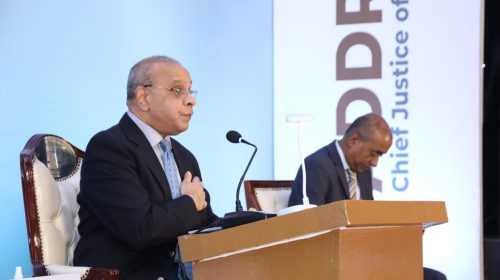Despite some challenges in Bangladesh, the high-level engagements like the Bangladesh Investment Summit 2025 and the recent visit by UK Trade Envoy Baroness Rosie Winterton signal growing interest in sectors such as renewable energy, IT, and infrastructure, said Bangladesh High Commissioner to the United Kingdom Abida Islam in an interview
The full text of the interview is given below :
What is the current trade volume between Bangladesh and the United Kingdom? What is our target for bilateral trade over the next five years?
Bilateral trade between Bangladesh and the UK now exceeds USD 6.0 billion. Bangladesh’s exports to the UK account for approximately USD 4.5 billion, while UK exports to Bangladesh are around USD 500 million. This trade balance heavily favors Bangladesh, primarily due to its strong ready-made garment (RMG) exports. Based on historical trends and the Export Promotion Bureau (EPB)’s typical target of a 5–7% increase in exports each fiscal year, Bangladesh’s exports to the UK are projected to grow to approximately USD 6.0 billion over the next five years. For the fiscal year July 2024 to June 2025, Bangladesh’s exports to the UK are estimated to reach around USD 4.5 billion. UK exports to Bangladesh for the same period are estimated at over USD 500 million, aligning with the Department for Business and Trade (DBT) report of GBP 552 million (approximately USD 750 million) in 2024.
Both nations are committed to significantly boosting and diversifying their economic relationship. This involves increasing overall trade volumes beyond the current figures for substantial growth, broadening Bangladesh’s export portfolio beyond RMG to sectors like pharmaceuticals, IT, and agro-processing, and attracting more UK foreign direct investment into Bangladesh.
Bangladesh and the UK are pursuing a shared vision to deepen economic ties through a range of strategic initiatives. These include enhancing trade frameworks by streamlining investor services, developing product showcases in London, exploring a trade office in Ireland, and strengthening frameworks like the UK’s Developing Countries Trading Scheme (DCTS). In the financial sector, efforts are underway to enhance remittance incentives, open branches of Bangladeshi banks in the UK, and introduce an Islamic Bond Scheme in GBP for the diaspora, while also addressing illegal money transfers. For workforce and skills, the focus is on expanding professional opportunities for Bangladeshis in the UK, particularly in healthcare and hospitality, and promoting the export of services.
Finally, in aviation and logistics, priorities include improving air connectivity through routes such as a proposed Sylhet–Stansted direct flight, reinstating cargo scanners, and launching specialized cargo services for perishable goods, including a dedicated “MANGO CARGO” initiative.
Question . How do you see the prospect of a Blue Economy in Bangladesh?
Bangladesh’s Blue Economy offers immense untapped potential for sustainable development, despite currently contributing only about 3% to our GDP. We must strategically invest to harness both our living and non-living marine resources to drive economic growth and foster regional integration.
Marine fisheries, aquaculture, biotechnology, and non-traditional species cultivation can generate significant jobs and innovation. Crucially, non-living resources like oil, gas, and seabed minerals are vital for our energy security, while ocean renewable energy, carbon sequestration, and sea salt production remain largely unexplored. Furthermore, the Bay of Bengal presents a “blue ocean” of opportunity for tourism.
Considering that our landlocked neighbours, Nepal and Bhutan, rely on transit through Bangladesh, enhanced marine trade, shipping, and logistics can truly position Bangladesh as a regional maritime hub. To ensure this growth is sustainable, investments in marine education, research, surveillance, and spatial planning are essential. Given the strategic geopolitical importance of the Bay of Bengal, we must carefully balance national sovereignty with strategic partnerships to secure long-term economic and environmental gains.
Question . The interim government, headed by Nobel laureate Dr Mohammed Yunus, is working on improving the business environment in Bangladesh. The United Kingdom has been the top investor in Bangladesh in the last two years. How do you see the interest of British investors about new investment in Bangladesh?
Bangladesh is undergoing a pivotal transition under the interim government led by Nobel Laureate Professor Muhammad Yunus, whose leadership signals a strong commitment to improved governance, transparency, and a more business-friendly environment. Encouragingly, the United Kingdom has been Bangladesh’s top investor for the past two years—reflecting not only economic confidence but also deep-rooted bilateral ties. British companies have tapped into Bangladesh’s vibrant domestic market, growing middle class, dynamic workforce, and strategic location, particularly in sectors such as ready-made garments, energy, financial services, and increasingly, technology.
Investor interest from the UK remains strong and is gaining renewed momentum. Professor Yunus’s leadership addresses long-standing concerns around regulatory clarity and ease of doing business, which British investors—known for their long-term outlook—are watching closely. The Bangladesh Investment Development Authority (BIDA) is playing a proactive role by fast-tracking key projects, expanding One-Stop Services, and resolving investor concerns. High-level engagements like the Bangladesh Investment Summit 2025 and the recent visit by UK Trade Envoy Baroness Rosie Winterton signal growing interest in sectors such as renewable energy, IT, and infrastructure.
While typical challenges of an emerging market—like infrastructure gaps and political uncertainty—persist, Bangladesh’s strong fundamentals, including its demographic dividend and economic momentum, continue to offer compelling opportunities. With sustained reforms, I remain confident that British investment will accelerate, advancing mutual growth and prosperity.
Question . Bangladesh has been a victim of climate change. How can Britain work with Bangladesh on this issue?
Bangladesh remains one of the most climate-vulnerable countries in the world, and we deeply value our strong and evolving partnership with the United Kingdom in addressing this existential challenge. The signing of the Climate Accord in 2023 marked a significant milestone, strengthening both our bilateral and multilateral cooperation on climate action.
We commend the UK’s continued global leadership on climate change, particularly its instrumental role in shaping the Glasgow Climate Pact—an achievement that advanced global net-zero commitments while amplifying the voices and needs of vulnerable nations like ours. Bangladesh looks forward to the UK’s sustained support in implementing the ‘Dhaka-Glasgow Climate Emergency Pact,’ with a focus on critical areas such as loss and damage, adaptation, and resilience building.
Our two countries are also key partners in global initiatives including the Global Ocean Alliance and the High Ambition Coalition for Nature and People. Looking ahead, there is immense potential for deeper collaboration—ranging from protecting vital ecosystems like the Sundarbans and scaling up nature-based solutions, to mobilizing climate finance for the Global Centre on Adaptation’s regional hub in Dhaka. In this decisive decade, our collective efforts will be essential in building a more sustainable and resilient future.
Question. Over the years, Bangladeshi students have had a deep interest in pursuing higher education in the UK. How do you see the prospects of Bangladeshi students about higher education in the UK?
The United Kingdom has long been—and continues to be—a premier destination for Bangladeshi students pursuing higher education. They are attracted by the UK’s world-renowned universities, diverse academic programs, and strong global career prospects. In recent years, the number of Bangladeshi students enrolling in British institutions has grown significantly, underscoring the enduring appeal and high regard for UK education.
This sustained interest is driven by several key factors. Prestigious scholarships such as Chevening, Commonwealth, GREAT, and various university-specific awards provide essential financial support, enabling talented students from diverse backgrounds to access top-tier education. Additionally, limited capacity in Bangladeshi universities makes overseas study a necessity for many, particularly for specialized and postgraduate courses. UK degrees are globally recognized and highly valued by employers, offering graduates a distinct competitive advantage. The excellence of British universities in research and innovation attracts students eager to engage with cutting-edge knowledge and world-class facilities. Furthermore, the UK’s richly multicultural environment—with students from over 200 countries—creates an inclusive and globally relevant academic experience.
However, Bangladeshi students also face challenges. Despite scholarship opportunities, the overall cost of tuition and living expenses in the UK remains substantial for many families. Adjusting to a new culture, different social norms, and a distinct academic environment can also be demanding. More recently, changes to UK immigration policies—such as restrictions on dependents and modifications to the Post-Study Work visa—have impacted international students, leading to a noticeable decline in student visa grants and overall enrollments.
Despite these hurdles, I think the UK will continue to be a leading choice for Bangladeshi students seeking world-class education and promising global careers.
Question. Brexit refers to the withdrawal of the United Kingdom (UK) out of the European Union (EU). Five years ago, on 31 January 2020, the UK left the European Union. How do British people see Britain out of Brexit?
Five years after the United Kingdom formally exited the European Union on January 31, 2020, Brexit continues to influence the country’s domestic affairs and international position. According to a 2024 YouGov poll, 62% of Britons believe Brexit has gone “badly,” while 18% say it has gone “well,” indicating a divergence between expectations and current outcomes. While some emphasize legislative autonomy and independent trade policies as outcomes of Brexit, the issue remains prominent in UK political, economic, and social discussions.
During this period, effects have been seen among both the British public and communities such as the Bangladeshi diaspora, as well as in bilateral relations. The Office for Budget Responsibility estimates that the UK economy is approximately 4% smaller than it would have been if it had remained in the EU, with exports to the EU falling by nearly 14% in 2021. Agriculture, fisheries, and automotive manufacturing sectors experience challenges related to market access and labor supply. In response, the UK has joined the Comprehensive and Progressive Agreement for Trans-Pacific Partnership (CPTPP) and initiated the Developing Countries Trading Scheme (DCTS), indicating increased focus on the Commonwealth and Global South.
Migration patterns have also shifted: despite intentions to reduce numbers, net migration reached 685,000 in 2023, partly due to labor shortages in healthcare, construction, logistics, and hospitality. Members of the Bangladeshi diaspora contribute significantly to these fields, maintaining strong bilateral connections. Culturally, there are changes in generational attitudes—60% of 18–34-year-olds support rejoining the EU, compared to 35% among those over 65—and the UK’s exit from initiatives like Erasmus, along with new visa requirements for artists, has affected cultural exchange.
For Bangladesh, Brexit presents both adjustments and possibilities. The DCTS allows continued duty-free access for over 90% of Bangladeshi exports, mainly garments and textiles, which is notable as Bangladesh approaches LDC graduation. At the same time, increased customs protocols, supply chain issues, and regulatory differences have posed challenges for Bangladeshi small and medium-sized enterprises in areas such as food processing and light manufacturing.
In summary, Brexit has produced significant changes in the UK’s internal and external environment. While national control has increased, economic and social consequences continue to be assessed. The ongoing debate focuses not only on the initial decision but also on strategies for managing its continuing impact. For Bangladesh, developments in the UK may offer opportunities for further collaboration based on shared interests and economic adaptation.
Question. Bangladesh economy has been under threat by the Iran-Israel conflict.
The world is facing an unprecedented surge in global conflicts, with 59 active disputes across more than 35 countries—the highest since World War II—resulting in 152,000 conflict-related deaths in 2024, according to the Institute of Economics and Peace. These tensions severely threaten the global economy, and Bangladesh is not immune to their effects. Already struggling to recover from COVID-19, the Ukraine crisis further strained the economy, while recent conflicts in Gaza and the Iran-Israel clash pushed the Middle East to the brink—though recent ceasefires and de-escalations have brought some relief.
For Bangladesh, these conflicts drive economic instability by raising commodity prices, disrupting supply chains, and worsening the cost-of-living crisis. Fluctuations in energy prices, shipping costs, and import bills directly affect our economic stability and development.
Bangladesh strongly believes that sustainable peace is essential for global stability and human welfare. We affirm that a two-state solution remains the only viable path to resolving the Israeli-Palestinian conflict and securing lasting peace in the Middle East.














